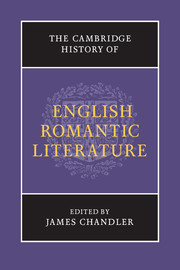Book contents
- Frontmatter
- Introduction
- Part I The Ends of Enlightenment
- Part II Geographies: The Scenes of Literary Life
- Part III Histories: Writing in the New Movements
- 15 Rebellion, revolution, reform: the transit of the intellectuals
- 16 Changes in the world of publishing
- 17 The new poetries
- 18 Romanticism and poetic autonomy
- 19 Transformations of the novel – I
- 20 Transformations of the novel – II
- 21 Theatre, performance and urban spectacle
- 22 The epigenesis of genre: new forms from old
- 23 The literature of the new sciences
- 24 The making of child readers
- Part IV The Ends of Romanticism
- Chronology
- Bibliographies
- Index
- 1 A New Pocket Map of the Cities of London and Westminster; with the Borough of Southwark, Comprehending the new Buildings and other Alterations, 3rd edn (London: William Faden, 1790).">
- References
18 - Romanticism and poetic autonomy
from Part III - Histories: Writing in the New Movements
Published online by Cambridge University Press: 28 May 2009
- Frontmatter
- Introduction
- Part I The Ends of Enlightenment
- Part II Geographies: The Scenes of Literary Life
- Part III Histories: Writing in the New Movements
- 15 Rebellion, revolution, reform: the transit of the intellectuals
- 16 Changes in the world of publishing
- 17 The new poetries
- 18 Romanticism and poetic autonomy
- 19 Transformations of the novel – I
- 20 Transformations of the novel – II
- 21 Theatre, performance and urban spectacle
- 22 The epigenesis of genre: new forms from old
- 23 The literature of the new sciences
- 24 The making of child readers
- Part IV The Ends of Romanticism
- Chronology
- Bibliographies
- Index
- 1 A New Pocket Map of the Cities of London and Westminster; with the Borough of Southwark, Comprehending the new Buildings and other Alterations, 3rd edn (London: William Faden, 1790).">
- References
Summary
The symbiotic growth of critical and literary self-consciousness is so striking a feature of the Romantic period that many participants at the time and many subsequent commentators have thought it the historical key to understanding Romanticism. This mutual development is of course in line with the gradual democratization of print culture from the restricted court circulation of poetry up to the seventeenth century down to the global internet of our own day. But in Romanticism the critical interaction between writer and reader presided over the democratic function communication is now often assumed to possess necessarily. From around 1798, in Britain and mainland Europe, a new critical establishment leaps into being. Its characteristic idioms extend from the elliptical and highly theorized aphorisms of the early German Romantic journals to the anti-systematic ad hominem / feminam broadsides of British critics writing for politically partisan Reviews. Corresponding to this increased journalistic attention paid to literary pretensions is the professional self-consciousness of writers, especially poets, the characteristic reflexivity of whose writing to some extent pre-empts the critics, making the question of literary reception part of its subject matter. ‘The poet, described in ideal perfection, brings the whole soul of man into activity’, trumpets Coleridge’s 1817 Biographia Literaria, the age’s outstanding attempt to bridge both German and British traditions by advocating a literature philosophically encoding a conservative purpose and a philosophy radically open to literary extension. But, as Shelley insisted a few years later, part of what poets thus activated was evidently a critical afterlife outlasting their own intentions for their work and bound to no single critical institution.
Keywords
- Type
- Chapter
- Information
- The Cambridge History of English Romantic Literature , pp. 427 - 450Publisher: Cambridge University PressPrint publication year: 2009



